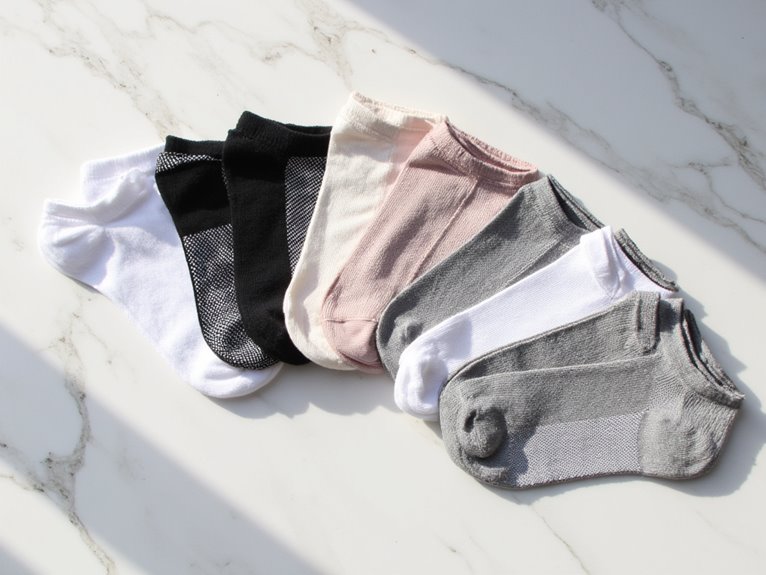Is It Better to Sleep on Silk or Cotton Sheets?
When deciding between silk and cotton sheets, consider your priorities. Silk sheets offer exceptional softness, natural temperature regulation, and breathability, making them ideal for those who tend to sleep hot or cold. They are also hypoallergenic and suitable for sensitive skin. However, they require gentle care and come with a higher price tag. Cotton sheets, on the other hand, are soft but can pill over time, and their breathability can be compromised by moisture absorption. To make an informed decision, it's essential to weigh these factors and examine the benefits and drawbacks of each option in more depth.
We are supported by our audience. When you purchase through links on our site, we may earn an affiliate commission, at no extra cost for you. Learn more. Last update on 29th December 2025 / Images from Amazon Product Advertising API.
Material Durability and Care
Silk sheets, in particular, require gentle care to maintain their durability, as they can be prone to snagging and runs if not handled properly.
To prolong their lifespan, it's essential to wash them in cold water using a mild detergent and avoid using fabric softener or bleach.
Avoid wringing or twisting, and instead, gently remove excess water.
Dry them on a low heat setting or air-dry to prevent shrinkage.
Ironing should be done on a low heat setting, and it's vital to avoid using steam.
Softness and Breathability Compared
While proper care is essential to maintaining the durability of silk sheets, their softness and breathability are equally important factors to weigh when choosing the right bedding for a comfortable night's sleep.
Silk sheets are renowned for their exceptional softness, providing an unparalleled level of comfort against the skin.
In contrast, cotton sheets, although soft, can be prone to pilling over time, reducing their overall softness.
With regard to breathability, both materials allow for airflow, but silk's natural temperature regulation properties make it an excellent choice for those who tend to sleep hot or cold.
However, cotton's breathability can be compromised by its tendency to absorb moisture, potentially leading to a clammy sleeping environment.
Temperature Regulation Benefits
Most people spend a significant portion of their lives sleeping, and a well-regulated sleeping temperature can make all the difference in the quality of their rest.
Silk sheets, in particular, excel in temperature regulation due to their natural thermoregulatory properties. They keep you cool in the summer and warm in the winter, ensuring a comfortable sleeping environment.
This is because silk is a natural insulator, trapping warm air close to the body in cold temperatures and releasing heat when it's warm. In contrast, cotton sheets can retain heat, making them less effective at regulating temperature.
This distinction is vital, as a well-regulated sleeping temperature can profoundly impact the quality of sleep and overall well-being.
Allergy Sufferers and Skin Issues
Individuals who suffer from allergies or skin issues may find that their sensitive skin reacts adversely to certain fabrics, making the choice of bedding essential for a restful night's sleep.
For these individuals, silk sheets can be a game-changer. Silk is a natural, hypoallergenic material that is resistant to dust mites, mold, and mildew, making it an ideal choice for those with sensitive skin.
Cotton, on the other hand, can harbor allergens and irritants, exacerbating skin issues. Silk's smooth, gentle texture also reduces friction, which can irritate skin conditions like eczema.
Cost and Value Analysis
When considering the cost and value of silk and cotton sheets, it's essential to evaluate the pricing of each material.
Silk sheets, renowned for their luxurious feel, typically come with a higher price tag, with high-quality sets ranging from $100 to $500 or more.
In contrast, cotton sheets offer a more affordable option, with prices varying from $20 to $100, depending on thread count and quality.
Silk Sheet Pricing
The cost of silk sheets can vary greatly, ranging from a few hundred to several thousand dollars, depending on factors such as thread count, material quality, and brand reputation.
Generally, a high-quality silk sheet set with a high thread count (above 300) and made from 100% Mulberry silk can cost between $500 to $1,000.
Mid-range options with a lower thread count (around 200) may fall in the $200 to $500 range.
Budget-friendly options made from blended silk or lower-quality materials can be found for under $200.
It's essential to weigh the cost against the benefits of sleeping on silk, including improved skin and hair health, reduced wrinkles, and a cooler sleeping temperature.
Cotton Sheet Value
Cotton sheets offer a more affordable alternative to silk, with prices ranging from under $20 for a basic set to over $100 for high-quality, high-thread-count options.
This wide price range allows consumers to choose a cotton sheet set that fits their budget and meets their needs.
While lower-priced cotton sheets may not be as durable, higher-end options can rival the quality of silk sheets at a lower cost.
When considering the value of cotton sheets, it's essential to weigh the cost against the benefits, including breathability, softness, and ease of care.
Sleeping Experience and Quality
In terms of sleeping experience and quality, the choice between silk and cotton sheets can make a significant difference.
The smoothness and softness of the fabric, as well as its breathability and cooling effects, can greatly impact the comfort and quality of sleep.
For those who suffer from allergies, the material's properties can also play a vital role in determining the quality of rest.
Smoothness and Softness Matter
Slipping into a bed adorned with silky smooth sheets can instantly improve the sleeping experience, as the gentle caress of smooth fabric against skin signals to the brain that it's time to relax and unwind.
Smoothness and softness play a substantial role in determining the quality of sleep. When sheets are rough or coarse, they can disrupt the body's natural sleep cycle, leading to restlessness and discomfort.
In contrast, smooth sheets can help reduce tossing and turning, promoting a deeper and more restorative sleep. Additionally, smooth fabrics can reduce friction, allowing for a more comfortable sleeping position and minimizing skin irritation.
Breathability and Cooling Effects
Beyond the importance of smoothness and softness, the breathability and cooling effects of bedding materials also play a vital role in regulating body temperature and promoting a restful night's sleep.
A breathable fabric allows for airflow, wicking away moisture and heat, while a cooling effect helps to dissipate body heat, preventing overheating and discomfort.
This is especially essential for individuals who tend to sleep hot or sweat heavily at night.
Silk bedding is known for its natural temperature regulation properties, keeping you cool in the summer and warm in the winter.
Cotton, on the other hand, is a natural breathable fabric that allows for airflow and moisture wicking.
The right balance of breathability and cooling effects can profoundly impact the quality of your sleep, leading to a more restful and rejuvenating night's rest.
Allergy Sufferers Take Note
For individuals who suffer from allergies, the choice of bedding material can profoundly impact their sleeping experience and overall quality of life.
Silk sheets are a better option for allergy sufferers as they are naturally hypoallergenic and resistant to dust mites, mold, and mildew.
Cotton sheets, on the other hand, can harbor allergens like dust mites, making them a less suitable choice.
Additionally, silk's smooth surface makes it difficult for allergens to cling to, reducing the risk of allergic reactions.



